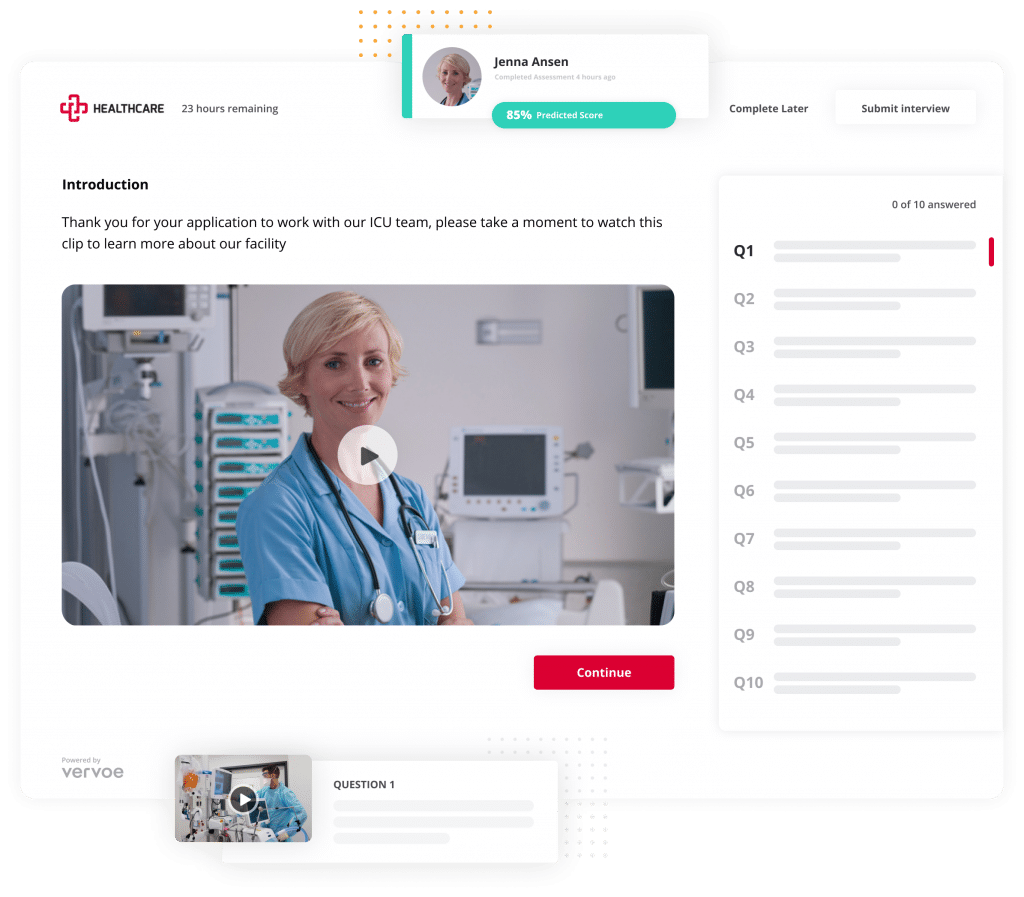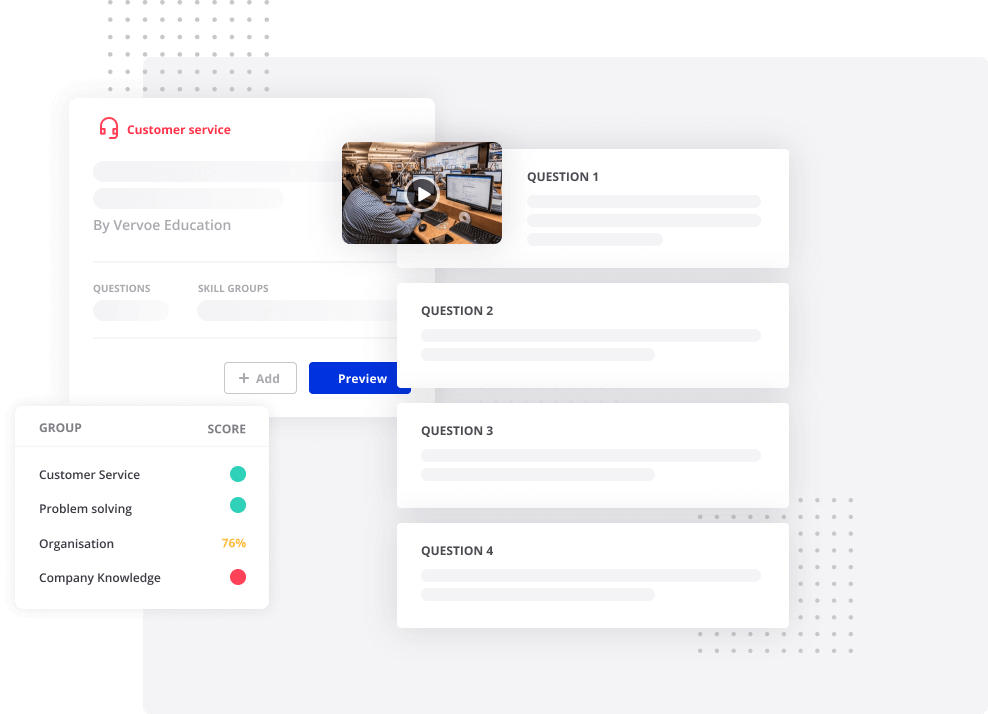You know how to recruit active candidates. There’s a clear-cut process to source, assess, and screen. But what about passive candidates? Can you follow the same processes?
Active candidates are easier to find and engage. They’re the ones that directly apply with up-to-date résumés, who follow your brand on social media and actively reach out to your team for a referral. But sometimes it’s necessary to extend your search out to people who aren’t actively looking for a new position. Up to 70% of the global workforce is made up of passive candidates.
Recruiting passive candidates can be tricky. Most of your fellow recruiters will tell you that it’s a delicate and highly personalized dance needed to lure these people in. And because their skills, experience, current company, and track record make them so appealing, it can be tempting to drop some of the processes you usually use to hire. Heaven forbid you should ask them to take an assessment!

Just because they require higher-touch doesn’t mean you can’t, or shouldn’t, use assessments for passive candidates.
Here’s why skills assessments are a crucial part of the process, and how to successfully integrate them into your passive hiring process.
Why passive candidates are different
A passive candidate is not actively looking for a job but has the skills that qualify them for your job opening. Sometimes if there aren’t enough active candidates, recruiters need to go after talent that isn’t actively looking.
Passive candidates are usually either:
- Perfectly happy in their current role and not looking for another one
- Unhappy in their current role but not doing anything about it
Each of these situations has its challenges. But they do have a few things in common. You’re unlikely to rely on a polished résumé for their credentials because they won’t have one prepared. Communication with these candidates is also done through informal channels, so you won’t be relying on your ATS to manage the process. And the process can take much longer because the candidate needs to be strategic about taking time off from work to participate in interviews or take your phone calls.
There can be some challenges from the employer side as well. Often when you’re looking for passive candidates, it’s for a role outside the usual hiring criteria or for a brand new position, so you’re not quite sure how to assess the role. Maybe you haven’t been able to define what the role looks like exactly.
With so many hoops to jump through from the start, it’s easy to see how many employers fall into the trap of letting processes slide. There’s a notion that if candidates don’t actively apply for your role, you should differently and a lot more leniently.
For many employers, this means not asking passive candidates to participate in the assessments you’d usually require.
Can you use skills assessments with passive candidates?
Engaging passive candidates should be the same as any other candidate who is interested in your role. That includes using skills assessments in the hiring process.
There’s a common misconception that passive candidates won’t like taking an assessment. Many employers remove this step of the process because they think making passive candidates take a test will immediately turn them off.
This couldn’t be further from the truth. When used skillfully in the process, assessments can help rather than hinder recruiting passive candidates.
Know when to use the assessment
As we’ve already established, recruiting passive candidates will take a bit of a deviation from the norm. If you’re accustomed to sending your active candidates an assessment as the first step of the hiring process (and here’s why you should), you’ll need to adjust this slightly for passive candidates.
Remember, these people are either delighted where they are or are comfortable being unhappy where they are. It’s critical to build rapport with these candidates before asking them to take an assessment. Engaging passive candidates is about building a relationship; they need to understand your offering as much as you want to understand what makes them tick.
Once you’ve identified their interest, you can ask them to complete a skills assessment. Make sure you highlight in your conversation the importance of this step. Clearly communicate that assessment is a vital part of your process and benefits both you and the candidate.
As Jeremy Crawford, Head of Talent Acquisition at health insurer Medibank notes:
“We do ask quite a lot of [candidates] before they may even get an update on their progress. What we’ve done is really bolstered the communication there to say, this is an online assessment, and here’s what it entails; but here’s also the reason why it’s important.
Just giving them some comfort that it fits within a particular framework of this process, and giving them an indication of what that looks like and if they are successful, what kind of communication they will receive.”
Give insight to get insight
So, what should you include in this assessment? When you have a high volume of applicants for a role, your first reflex might be to use an assessment that will differentiate them by their skills. But what about passive candidates, where you already know a bit about their skills and experience?
A great assessment is actually the same for both kinds of candidates. It should offer insight both for you and for the candidate. Flexible solutions like Vervoe will allow you to customize the candidate experience for your brand. This means you could include:
- Content like videos and documents that help the candidate understand your organization
- All questions and content look and sound like they are from your company
- Immersive-style questions that let candidates apply their skills to problems that the organization is trying to solve

Part of successfully wooing a passive candidate is winning them over not only on the role but on your organization’s mission, values, and culture. The assessment you give them should give them a preview of what it’s like to be part of the company and team and expect day-to-day on the job.
Test the right skills
The other important thing to consider is what you’ll be asking the candidate in the assessment. We briefly mentioned the power of immersive-style questions, but what does that mean?
Most skills, psychometric or gamified assessments don’t offer a lot of context about the role. Re-ordering shapes, finding the next number in a pattern, or matching faces to emotions won’t make sense to most candidates. How does it help them prove they can do the job well? How does it help them understand your organization?
If candidates can’t see the value of doing your assessment, they won’t do it.
An immersive-style assessment lets them showcase their skills in a way that has meaning and context. If they need to pitch to a customer, ask them to submit a pitch. If they’re going to lead your marketing team, ask them to format a brief strategy document. If they’ll be analyzing your business data, give them a sample in a spreadsheet.

By asking them questions that are in the context of the role, the candidate will see the value in what you’re asking of them and will be glad to have the opportunity to show off.
Don’t slow the process down
Most of the time, recruiters are looking for passive candidates because they require hard-to-find skills or a certain pedigree of performance. Active and passive candidates with these types of credentials disappear quickly, so the quicker you can make an offer, the better.
Thankfully, modern assessment technology supports you to make offers faster. Most assessments are now online, which means the headache of scheduling an interview or making secretive phone calls is a thing of the past.
Most assessments will offer some sort of automatic grading as well. This grading, however, is based on ‘right’ or ‘wrong’ answers. But especially for customized tests, there’s not really clear ‘right’ and ‘wrong’ answers. Instead, there’s a spectrum of ‘good’ answers and ‘not as good’ answers based on your organization’s needs.
Using machine learning, Vervoe can automatically grade your passive candidates’ responses and rank them based on how well they can do the job. In just a few clicks, you can then train your algorithm based on your preferences. Need a customer sales rep and prefer them to demonstrate a solid grasp on grammar? Vervoe will learn that’s valuable to you and automatically grade those responses highly.
Aside from technology, internal processes can get in the way of making a quick decision. No hiring decision is made in a vacuum, so it’s essential that sharing information on candidates is made easy. Make sure you’re able to quickly send results and profiles to everyone involved in the hiring decision.
What to do if they refuse
If you’ve made it as far as offering them the assessment, you’ve built some degree of rapport. Passive or not, the candidate has shown interest and motivation to keep talking to you. If they don’t want to take the assessment, you need to ask why.
Some passive candidates will decide that it’s easier to stay in their current role’s comfort and stability. Some may change their mind throughout the process. Some may even consider taking an assessment too hard or not worth it for the role.
Regardless of the reason, taking an assessment for the role indicates that your passive candidate is willing to take the next step to work with your organization. Otherwise, perhaps it’s not a great fit or right timing.
It’s not a no, it’s a “not right now”
While passive candidates can be challenging to deal with, they can often be the best hires you make. Remember that even if it doesn’t work out, you’ve built a relationship with someone and shown your company in the best possible light using assessments.
If they say “no” to your offer, it doesn’t have to be the discussions’ end. Don’t forget to ask them for referrals, and keep in touch – you never know when they might be looking for a role again!




















